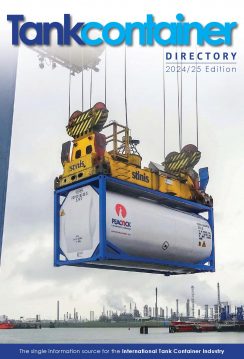Klinge Corporation is reaping the rewards of 30 years of innovation in the refrigerated and tank container field, reports Dan McCue
As a result of three decades of thinking ahead, Klinge Corporation is now riding the crest of two trends it anticipated long before others.
The first is the accelerated growth in demand for dual refrigeration and heating systems, now deemed essential fail-safes in the world of high-value and dangerous cargo; the other, tangentially related to the first, is a new-found market for explosionproof equipment to transport certain flammable liquids.
“That’s a really interesting market, though only a small fraction of the industry just like the other markets we serve” says Allan Klinge, president and sales manager, a day after returning from a recent industry conference in Rotterdam, Netherlands.
“We were coming up with a number of offerings in that space pretty much as the market started to develop ... and it’s really come on in just the past two years.”
Although established as a US-based company in 1984, Klinge Corporation traces its history back to post-World War II Denmark. Its forebear was Paul Klinge A/S, a trading company serving multinational corporations like Union Carbide, now known as Energizer, and York International, which got involved with the refrigerated side of container cargo shipment in the early 1970s.
“At the time, containerisation was really taking off and they were looking for more efficient methods of transporting not only dry goods but also refrigerated goods. That led to York International producing a line of equipment to meet that need, primarily for the export market,” says Klinge.
As it happens, Klinge’s father and grandfather served as the primary agents in many of those sales, and when York decided to get out of that side of the business, the Klinges purchased its marine transport
refrigeration equipment department and set up operations in Pennsylvania, while maintaining sales offices and production facilities in Denmark and a service company in Egypt.
The new entity’s initial focus was on providing better transport solutions for food items, mostly in standard equipment. But as the years passed, the company diversified – often dramatically.
Now, in addition to its legacy activities, the company develops specialised equipment for the military market, explosion-proof equipment for use in hazardous gas environments, glycol-circulation systems for tank containers, -60 Celsius freezer containers and a host of offerings that are a mix of all of these and systems for extra backup for high-value and dangerous cargo.
“There were two things that happened,” says Klinge of the.............
If you wish to read the full article you will need to subscribe to the magazine. May 3, 2017
As a result of three decades of thinking ahead, Klinge Corporation is now riding the crest of two trends it anticipated long before others.
The first is the accelerated growth in demand for dual refrigeration and heating systems, now deemed essential fail-safes in the world of high-value and dangerous cargo; the other, tangentially related to the first, is a new-found market for explosionproof equipment to transport certain flammable liquids.
“That’s a really interesting market, though only a small fraction of the industry just like the other markets we serve” says Allan Klinge, president and sales manager, a day after returning from a recent industry conference in Rotterdam, Netherlands.
“We were coming up with a number of offerings in that space pretty much as the market started to develop ... and it’s really come on in just the past two years.”
Although established as a US-based company in 1984, Klinge Corporation traces its history back to post-World War II Denmark. Its forebear was Paul Klinge A/S, a trading company serving multinational corporations like Union Carbide, now known as Energizer, and York International, which got involved with the refrigerated side of container cargo shipment in the early 1970s.
“At the time, containerisation was really taking off and they were looking for more efficient methods of transporting not only dry goods but also refrigerated goods. That led to York International producing a line of equipment to meet that need, primarily for the export market,” says Klinge.
As it happens, Klinge’s father and grandfather served as the primary agents in many of those sales, and when York decided to get out of that side of the business, the Klinges purchased its marine transport
refrigeration equipment department and set up operations in Pennsylvania, while maintaining sales offices and production facilities in Denmark and a service company in Egypt.
The new entity’s initial focus was on providing better transport solutions for food items, mostly in standard equipment. But as the years passed, the company diversified – often dramatically.
Now, in addition to its legacy activities, the company develops specialised equipment for the military market, explosion-proof equipment for use in hazardous gas environments, glycol-circulation systems for tank containers, -60 Celsius freezer containers and a host of offerings that are a mix of all of these and systems for extra backup for high-value and dangerous cargo.
“There were two things that happened,” says Klinge of the.............
If you wish to read the full article you will need to subscribe to the magazine. May 3, 2017
You currently do not have access to this article, please login or register to read more.
Login to read more





